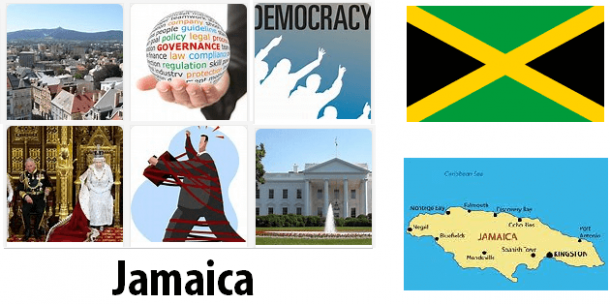Jamaica Government and Politics
State and politics

GOVERNMENT
Jamaica has been an independent parliamentary democracy in the Commonwealth since 1962. The head of state is the British monarch, represented by a Governor-General, appointed on a proposal by the Prime Minister of Jamaica. The government, headed by the Prime Minister, has the executive power.
The legislative power is exercised by a parliament with two chambers: a Senate with 21 members appointed by the Governor-General, 13 on the proposal of the Prime Minister and eight proposed by the Leader of the Opposition, and a House of Representatives with 63 members, who are elected every five years in general elections in one-man constituencies. British model.
Policy
Since the time before independence, the two largest political parties have been the Democratic Socialist People’s National Party (PNP) and the corporate- friendly Jamaica Labor Party (JLP). PNP emphasizes social reform and economic independence, while JLP wants stronger political and economic ties with the United States. After 18 years in power, the PNP lost in 2007 to the JLP, whose leader Bruce Golding formed government.
The PNP regained power after the 2011 parliamentary elections and the party’s chairman Portia Simpson-Miller became prime minister for the second time; In 2006, she became the country’s first female head of government. After the 2016 election, Andrew Holness became prime minister since JLP took a very tight victory with 32 seats against 31 for PNP. After the election, eleven of the members of the House of Representatives (17 percent) were women.
Judiciary
The legal system in Jamaica is largely based on English law. The legal rules introduced by the British during the colonial period continue to apply insofar as they have not been changed by domestic legislation or domestic precedents. However, both the legislation and the practice of the courts still follow today’s legal development in England. The highest courts in the country are the Supreme Court and the Court of Appeal. The death penalty can be punished for some serious crimes.
Human Rights
Social and economic turmoil characterizes large parts of Jamaican society. High unemployment, corruption and a weak economy favor organized crime, and violent crime is a major problem on the island. Particularly affected are the poorer areas of cities. Jamaica is one of the countries in the world with the highest number of murders per inhabitant per year.
Special police units have been set up to curb corruption and control organized crime. At the same time, the Jamaican police have been criticized for assault and extrajudicial executions in connection with the action. The impunity for police officers is widespread.
Jamaica has not formally abolished the death penalty, but since 1988 no executions have been carried out.
The Jamaican judiciary is overloaded with long processing times. The conditions in prisons are substandard and are often characterized by overcrowding and lack of food. Abuse and abuse occur both by and between prisoners.
Sexual violence against women and girls, human trafficking and child labor are serious problems. The government has adopted a national action plan to combat violence against women, which, among other things, has introduced stricter legislation for sex offenders.
In 2013, LGBT organizations reported an increase in attacks, harassment and threats against HTBQ persons. Hate crime reports are rarely investigated or delayed.
Health care is free and is considered relatively good, although the quality and availability of medicines vary. Press freedom is also considered good and the country places itself high on Reporters Without Borders Press Freedom Index, in the 2015 survey, Jamaica was ranked 9 out of 180.
Prime Ministers
| 1959-62 | Norman Manley |
| 1962-67 | Alexander Bustamante |
| 1967 | Donald Sangster |
| 1967-72 | Hugh Lawson Shearer |
| 1972-80 | Michael Manley |
| 1980-89 | Edward Seaga |
| 1989-92 | Michael Manley |
| 1992-2006 | Percival J. Patterson |
| 2006-07 | Portia Simpson-Miller |
| 2007-12 | Bruce Golding |
| 2012-16 | Portia Simpson-Miller |
| 2016- | Andrew Holness |

History . – Formerly a British colony, Jamaica became an independent state on 6 August 1962 within the Commonwealth ; it is part of the UN and the OAS (Organization of American States). Head of state is the sovereign of the United Kingdom, represented by a governor general; executive power is devolved to the Council of Ministers, chaired by a prime minister accountable to legislative assemblies. The first elections after independence (February 21, 1967) brought the Jamaica Labor Party to governmentby the elderly politician Sir Alexander Bustamante. The island’s economic situation has worsened considerably since (1965) Great Britain closed immigration to Jamaicans, causing unemployment to rise despite the increase in industries and tourism. The elections of February 2, 1972 saw the defeat of the Labor Party and the victory of the National People’s Party, whose leader, M. Manley, became prime minister. The new government, in addition to vigorously fighting socio-economic hardships, has carried out a clearly nationalistic policy, contrary to US capital, which is accused of exploiting Jamaican sources of wealth.


